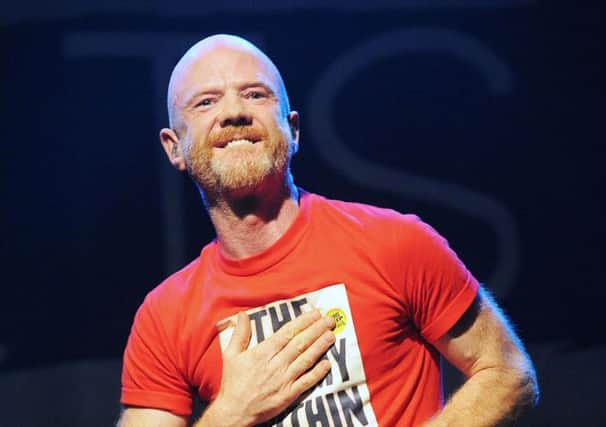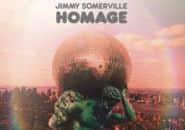Jimmy Somerville on loving his new album, Homage


In her memoir Bedsit Disco Queen, Everything But The Girl frontwoman Tracey Thorn bemoans the reductive, nostalgic portrayal of a 1980s she doesn’t recognise – a decade of yuppies, ra-ra skirts and Duran Duran drinking tropical cocktails on yachts.
Instead, she remembers the 1980s as a time of radical culture and politics, not celebrating consumerism but kicking against Thatcherism, the 1980s as portrayed – admittedly in a feelgood moviefied way – in the film Pride.
Advertisement
Hide AdThis was also Jimmy Somerville’s 1980s. His first band, Bronski Beat, headlined the 1984 Pits and Perverts benefit concert, organised by gay and lesbian activists in support of the striking miners, which is portrayed in the film. He wrote the Communards’ elegiac hit For A Friend in tribute to Pride protagonist Mark Ashton. He was an active member of the Red Wedge collective of musicians promoting left-wing politics in the run-up to the 1987 general election. And he penned one of the era’s great anthems, Smalltown Boy, the plaintive lament of a young gay man running away from home to find acceptance elsewhere.


“People don’t just say ‘I love that song’,” says Somerville, who recorded a piano version to mark its 30th anniversary last year. “It’s more about ‘This song affects me in this way, this song helped me in this way,’ and I’m very proud of that.”
The song was the singer’s own story. Somerville grew up in Glasgow in the 1970s – no easy place to be a young gay man. “Glasgow in the 70s was a hard city,” he says. “I knew that I would be trapped and that was not a healthy situation for me as a young man. But then, I had my own personal baggage that I was taking with me.”
Somerville moved to London in 1980, where he mixed with runaways from all over the country in the city’s squatting scene, and found a home for his distinctive falsetto voice in synthpop trio Bronski Beat and later in soul pop duo the Communards. But Glasgow at least gave Somerville some key early musical experiences, not least his first encounter with what was to become a life-long love of disco.
“The first record I ever danced to in a grown-up disco was Donna Summer’s A Love Trilogy. I danced for the full 15 minutes and I thought to myself, ‘This is it, this is what it’s all about.’ That was in a straight club, but because it was playing disco, it attracted a mix of people who were tolerant of people who were obviously gay and a bit eccentric and a bit out-there. Everyone was in that basement because of a love of music.”
Somerville also credits Carl Bean’s I Was Born This Way and the Village People’s self-titled song from their debut album as a revelation of gay visibility. He has paid tribute to the disco genre throughout his career, covering I Feel Love with Bronski Beat, Don’t Leave Me This Way and Never Can Say Goodbye with the Communards and Sylvester’s classic You Make Me Feel (Mighty Real) as a solo artist.
Advertisement
Hide AdBut only now has Somerville taken the step of recording an album of disco originals. Titled Homage, this is no hasty response to the latest reboot of this resilient genre, courtesy of Mark Ronson’s Uptown Funk and the revival of the mighty Chic, but the fulfilment of a long held musical ambition for Somerville. He does, however, share with those artists the love of a live band. No electronics were touched in the making of this album.
“Connecting with the musicians was the most amazing, humbling experience,” he says. “They were giving something of themselves to me because they loved being part of it. I just keep gushing about it because it’s been a long time since I’ve been that excited by music.”
Advertisement
Hide AdThe experience of making Homage has been a great morale boost to Somerville, who has been largely off the public radar since the Communards split in the late 1980s and the early days of his solo career. He has never stopped making music over the years, but has preferred to maintain a low profile in London, barely promoting his work. Homage, however, is one to herald from the rooftops.
“I don’t know what will happen commercially with this album,” he says, “but the most important thing for me is that I finally made the album that as a teenager I would have bought, took it home, put it on, opened up the gatefold and read through the sleeve and I’d have been sitting on my bed thinking ‘this is heaven’. I can actually say for the first time that from track one to track 12 I am completely in love with this album and I’ve never actually had that through anything I’ve done. There’s always been some reservation.”
Surprisingly, Somerville was even down on Smalltown Boy for many years, fearing the lyrics were not eloquent enough. It has taken him even longer to learn to love his extraordinary and instantly recognisable voice.
“I discovered later in life that there’s not that many men with a counter-tenor vocal ability,” he says. “I think if I’d maybe been in a choir or more encouraged at school I would have had a more positive approach to my voice but because of my sexuality and having this voice which was higher, I thought it was freaky, I thought it was defective. I’ve always had that at the back of my head and it’s only in the last five years or so that I’ve understood that I’ve got quite a special gift and I can really celebrate it.” n
• Homage is released by Cherry Red Records on 9 March